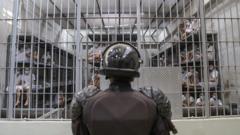As Iran and the United States prepare for what could be a pivotal round of diplomatic talks concerning Iran's nuclear program, tensions simmer within the region, particularly for Israel. Historically, Israel has relied on President Trump’s stringent measures against Iran, given Tehran's verbal hostility towards the Jewish nation. During his first term, Trump took notable actions against Iran, including the assassination of a significant Iranian military figure and the imposition of severe economic sanctions that crippled the nation’s economy. Trump also famously moved away from a multilateral agreement designed to limit Iran’s nuclear capabilities.
U.S. and Iran Prepare for Another Round of Nuclear Negotiations Amid Israeli Concerns

U.S. and Iran Prepare for Another Round of Nuclear Negotiations Amid Israeli Concerns
Amid evolving diplomatic negotiations, the Trump administration balances military threats and peaceful dialogues over Iran's nuclear program, all while Israel remains vigilant.
Now, with the prospect of a military intervention in the Middle East off the table for the time being, President Trump is adopting a more cautious approach. “If we have to do something very harsh, we’ll do it,” Trump stated in a recent interview. Despite this ambiguous stance on military readiness, he is reportedly urging Israel to delay any strikes on Iranian nuclear facilities while negotiations occur.
Confusion persists, however, regarding the U.S. objectives in these talks. Steve Witkoff, Trump’s chief envoy in the negotiations, has oscillated in his position, at one point suggesting that Iran might be allowed a limited nuclear program, before shifting to a stronger stance advocating for complete dismantlement of Iran's capabilities. This mixed messaging complicates the dialogue with Iran.
Adding further nuance to the negotiations, Secretary of State Marco Rubio emphasized that any agreement must ensure Iran never develops nuclear weapons, asserting, “It has to be something that not just prevents Iran from having a nuclear weapon now, but in the future as well.” As both nations head into this crucial dialogue, the international community—and particularly Israel—will be closely monitoring the outcomes and implications of these discussions.
Confusion persists, however, regarding the U.S. objectives in these talks. Steve Witkoff, Trump’s chief envoy in the negotiations, has oscillated in his position, at one point suggesting that Iran might be allowed a limited nuclear program, before shifting to a stronger stance advocating for complete dismantlement of Iran's capabilities. This mixed messaging complicates the dialogue with Iran.
Adding further nuance to the negotiations, Secretary of State Marco Rubio emphasized that any agreement must ensure Iran never develops nuclear weapons, asserting, “It has to be something that not just prevents Iran from having a nuclear weapon now, but in the future as well.” As both nations head into this crucial dialogue, the international community—and particularly Israel—will be closely monitoring the outcomes and implications of these discussions.





















